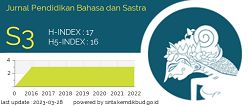Acehnese EFL Students and Teacher’s Motivational Teaching Strategy in the Classroom
Abstract
This qualitative case study aims to find out the nature of students and teacher’s motivational teaching strategy developed by Dornyei (2001) in teaching English in the classroom. The subject of this research was 1 English teacher in SMP Darul Qur’an Aceh Besar. The data were collected from observation checklist and its note. The findings of this research showed from the 35 motivational teaching strategies developed by Dornyei (2001), there are a total twenty-two motivational strategies applied by teacher during the observation. In the first stage, namely creating the basic motivational condition, there are seven strategies applied, in the second strategies, namely generating initial motivation, there are five strategies, in the third stage, namely maintaining and protecting motivation there are nine strategies, and the last stage, namely the encouraging positive retrospective self-evaluation, there are one strategy applied by teacher. The result displayed those motivational strategies received assorted reactions from students, positive and negative. Thus, these findings can be a reflection for increasing quality, fixing and developing English teaching strategy based on students’ need so that it can help teacher in boosting students’ motivation.
Keywords
Full Text:
PDFReferences
Alshehri, E. (2012). Saudi EFL teachers’ and students’perceptions of motivational strategies. Lancaster University Postgraduate Conference in Linguistics & Language Teaching, 7, 26-50.
Astuti, S.P. (2016). Exploring motivational strategies of successful teachers. TEFLIN Journal, 27(1), 1-22.
Bekhta, B., & Amine, B. (2021). Group work as motivational factor in enhancing students’ writing skill: the case of third year EFL students in foreign languages department at Ahmed Salhi university center, Naama. The Arabic Journal of Human and Social Sciences, 2(13), 176-196.
Braun, V., & Clarke, V. (2006). Using thematic analysis in psychology. Qualitative Research in Psychology, 3(2), 77-101.
Cheng, H.F., & Dornyei, Z. (2007). The use of motivational strategies in language instruction: The case of EFL teaching in Taiwan. Innovation in Language Learning and Teaching, 1(1), 153-174.
Creswell, J.W. (2007). Research design. California: SAGE Publication
Dornyei, Z., & Csizer, K. (1998). Ten commandments for motivating language learners: Results of an empirical study. Language Teaching Research, 2(3), 203-229.
Dornyei, Z. (2001). Motivational strategies in the language classroom. Cambridge: Cambridge University Press.
Fatmawati, M., Haura, R., & Supiani. (2020). Factors affecting EFL learners’ confidence in speaking English at the MEC English course Banjarmasin. International Conference On Social Sciences & Humanity, Economics, And Politics, 102-108.
Gardner, R.C., Masgoret, A.M., Tennant, J., & Mihic, L. (2004). Integrative motivation: changes during a year -long intermediate level language course. Language Learning, 54(1), 1-34.
Gultom, E., & Saun, S. (2016). The role of classroom management in creating an effective English learning. Journal of English Language Teaching, 5(1), 18-24.
Guilloteaux, M. J., & Dornyei, Z. (2008). Motivating language learners: a classroom-oriented investigation of the effects of motivational strategies on student motivation. TESOL Journal, 42(1), 55-77.
Kassing, R. B. (2011). Perceptions of motivational teaching strategies in an EFL classroom: The case of a class in a private university in Indonesia. (Thesis, Victoria University of Wellington, 2011). Retrieved 10 November, 2021 from http://researcharchive.vuw.ac.nz/xmlui/bitstream/handle/10063/1835/thesis.pdf?sequence=2.
Lao, T.L. (2020). The relationship between ESL learners’ motivation, willingness to communicate, perceived competence, and frequency of L2 use. Studies in Applied Linguistics & TESOL, 20(2), 36-56.
Masdianti. (2021). The implementation of teacher’s humor in the classroom. Journal Umma Scope of English Language Teaching, Literature and Linguistics, 4(2), 110-120.
Nisa, N.N., & Suwartono, T. (2020). Fun ways in learning English. Journal of Applied Linguistics, 2(1), 43-50.
Ormrod, J.E. (2012). Human learning (6th ed.). USA: Pearson Education. Inc.
Papi, M., & Abdollahzadeh, E. (2011). Teacher motivational practice, student motivation, and possible L2 selves: An examination in the Iranian EFL context. Language Learning, 62(2), 571-594.
Pelletier, L.G., & Rocchi, M. (2016). Teachers’ motivation in the classroom. In: Liu W., Wang J., Ryan R. (eds) Building Autonomous Learners. Springer, Singapore.
Rao, P.S. (2019). The importance of speaking skills in English classrooms. Alford Council of International English & Literature Journal, 2(2), 6-18.
Secer, S. Y. E., Sahin, M., & Alci, B (2015). Investigating the effect of audio - visual materials as warm up activity in aviation English courses on students’ motivation and participation at high school level. Procedia – Social and Behavioral Sciences, 199, 120-128.
Siska, S.S. (2015). Using film to increase motivation for speaking in English course classroom. TELL- US Journal, 1(2), 51-57.
Situmorang, M.A. (2021). Students’ perception of using group work in English class. Journal of English teaching, 7(1), 81-88.
Soraya, I., Kurnia, F.D., & Setiawan, S. (2018). Teacher’s motivational strategies used in Indonesian EFL Islamic university students. International Conference on English Language Teaching, 145, 286-290.
Szentes, E., Horvath, Z.I., & Harangus, K. (2020). The role of humor in teaching: teacher training students’ image of teacher and views on teaching. Acta Universitatis Sapientiae, Philologica, 12(2), 84-98.
Syarifuddin, S.W., Zulfah. (2020). Analysis of reward and punishment in EFL classroom. Journal of Islamic Studies and Society, 1(2), 68-90.
Vollet, J. W., Kindermann, T. A., & Skinner, E. A. (2017). In peer matters, teachers matter: Peer group influences on students’ engagement depend on teacher involvement. Journal of Educational Psychology. Advance online publication. 1(1), 1-18.
Wicita, G.G. (2015). A set of English instructional materials using task-based learning for news production management study program in stmm “mmmtc” Yogyakarta. LLT Journal 18(1), 63-73.
Wirentake., Iragiliati, E., & Prayogo, J.A. (2017). Students’ perception of motivational teaching strategies in English as foreign language (EFL) classroom. Jurnal Tambora, 2(1), 1-11.
Zhu, H. (2010). An analysis of college students’ attitudes towards error correction in EFL context. Canadian Center of Science and Education English Language Teaching, 3(4), 127-131.
DOI: https://doi.org/10.17509/bs_jpbsp.v22i1.47650
Refbacks
- There are currently no refbacks.
Copyright (c) 2022 Jurnal Pendidikan Bahasa dan Sastra
p-ISSN 1412-0712 | e-ISSN 2527-8312
JPBS is published by:
Fakultas Pendidikan Bahasa dan Sastra (Faculty of Language and Literature Education), Universitas Pendidikan Indonesia,
in cooperation with
TEFLIN, and APPBIPA


